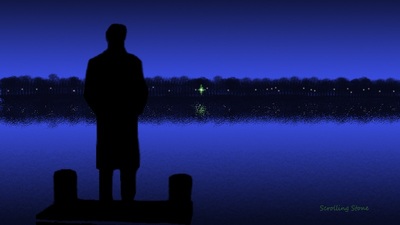“He had come a long way to this blue lawn, and his dream must have seemed so close that he could hardly fail to grasp it. He did not know that it was already behind him, somewhere back in that vast obscurity beyond the city, where the dark fields of the republic rolled on under the night.”
Those words have haunted me since I read them in high school. Jay Gatsby was a fictional character, a creation of F. Scott Fitzgerald’s mind, but his story of seeking something from his past (a something that seemed close enough to grab yet was already forever behind him) has stuck with me.
Gatsby’s fixation, a moment from his youth, a girl named Daisy, continued to flirt with and torment him. The green light at the end of her dock across the water was to him a beacon of hope. He had taken the long way around (as one not born rich) and worked hard to increase his social status, he had achieved more than most men who started where he did—yet he still was not acceptable to her or those of her class and never would be despite his effort.
“…but now he found that he had committed himself to the following of a grail. He knew that Daisy was extraordinary, but he didn’t realize just how extraordinary a ‘nice’ girl could be. She vanished into her rich house, into her rich, full life, leaving Gatsby—nothing. He felt married to her, that was all.”
Daisy, to everyone besides Gatsby, was a frivolous person, oblivious to the carnage in her wake, and a strange obsession for a man who had everything. But to him, in his mind looking backward, she represents something that had escaped him, perhaps the innocence of his youth or just a moment of time that passed him by that could not be recaptured despite the greatness he achieved. It could be as simple as his wanting her acceptance.
Ultimately Gatsby’s dream of a restored youthful romance ended in his actual death. He was murdered, the result of a confusing set of circumstances involving Daisy’s recklessness, and his deluded hopes died with him. It was sad end, but almost the most merciful end, because he was locked in and could not escape a tragic fate.
The Mennonite Gatsby…
I’ve always been a nostalgic and sentimental person. For better or worse, I’ve often been last to leave, the one who held on a little longer, and a person guided more by loyalties than practical concerns. This disposition is probably why Gatsby’s hopeless pursuit of things already behind him had resonated with me. It was sometimes difficult for me to distinguish the past from the future.
This backward orientation is also part of my religious cultural inheritance. Mennonites, like other Anabaptist groups, seem to find most of their identity in defining historical figures and moments. Ideas like non-conformity, while originating as a reference to a radical transformation of heart, have become primarily about maintaining a cultural status quo and preserving a Mennonite appearance. Mennonite attempts to re-brand their denomination usually reach backward for their inspiration.
Unfortunately, the past, no matter how hard you reach for it, will always stay right beyond your grasp.
And, eventually, a person reaching back rather than forward will sacrifice the only opportunity they have for a future.
There was an ideal within the Mennonite church that had held me captive for many years. It is the story of those who do all the right Mennonite things, who find their perfect Mennonite partner, have their beautiful half dozen kids, find their special place in the church, and feel good about themselves in the process. I had failed to achieve at many points along the way and still had hopes that someday the right pieces would fall into place for my happily-ever-after story to begin. It was the day that never came. My Mennonite dream was somewhere in my past, forever behind me, but I was so heavily invested and didn’t know how to let go.
In the past year, mostly in one cataclysmic moment, the dreams of my continued participation in the Mennonite church were extinguished. It was not that I was disallowed, I was not excommunicated nor was it physically impossible for me to attend, but the desire to belong that had propelled me onward for many years had disappeared. After years of struggle, after years of faithful devotion to a hope against hope, there was simply nothing left about the denomination for me to love.
Could Gatsby have continued to live on after his dream died?
The outcome I had feared was now upon me and inescapable. But, unlike Gatsby whose end came with poetic grace, my story continued brutally on—a forced march into the void that had become my life. There was no longer a reason within myself to continue on. Had I not had someone who needed me, who told me that if I go to take them with me, I would certainly have ended my own miserable existence.
I continued to walk although dead inside.
I continued to do my job but without a reason besides that one person who had their hopes tied up in me.
Later, in the spring, I mourned with my grandpa who lost his wife of six decades. He had lost the wife he knew, who spent all those many years faithfully beside him, who shared a part in so many of his memories and could never be replaced. Her death had profound implications for someone who had hoped to someday achieve what they had. It is a dark moment of realization that all of our cherished dreams will eventually die—only my dreams of having what my grandparents did in their years together died before ever being born and thus would never get so much as a decent burial.
In truth, what was me has died with my dreams and is now gone forever. I am the same person and yet there is this strong feeling that I’m a different person in a body that was once occupied by someone else. I don’t care about many of the things that I once did. I’m not as afraid to take risks that were once impossible for me. And, nearly a year after setting foot in my old church, I do not miss any of it. My friends from the past remain my friends, but there is nothing about being Mennonite that appeals to me like it once did. Even discussing Mennonite issues has become more difficult because it has stopped mattering anymore.
I’ve done what was impossible for me this past year. I’ve left the Mennonite denomination and have no intention of going back—there is nothing there for me anymore. There is not a feeling of loss nor even understanding of why I longed to be a part of everything there. I’m living beyond the death of my dreams, I’ve died with my dreams, and I am a different person. My Mennonite dream betrayed me, it left me to die cold and alone, but God’s love never left my side.
My hopes built over many years had expired. However, by God’s grace, I’ve continued on in love and have found deeper faith. We will all die, everything in this world will pass away, and with it even the meaning of our struggles here. But, after all, is stripped away from our existence, gone forever and never to return, only true love remains.
A friend from my new church posted this…
“Everything betrays you: family, friends, acquaintances, riches, sensory pleasures. Even your own body will leave you at some point. All the elements of nature deceive you. So make sure you cleave to God, because He alone is love.” —Saint John of Kronstadt (20th century)

